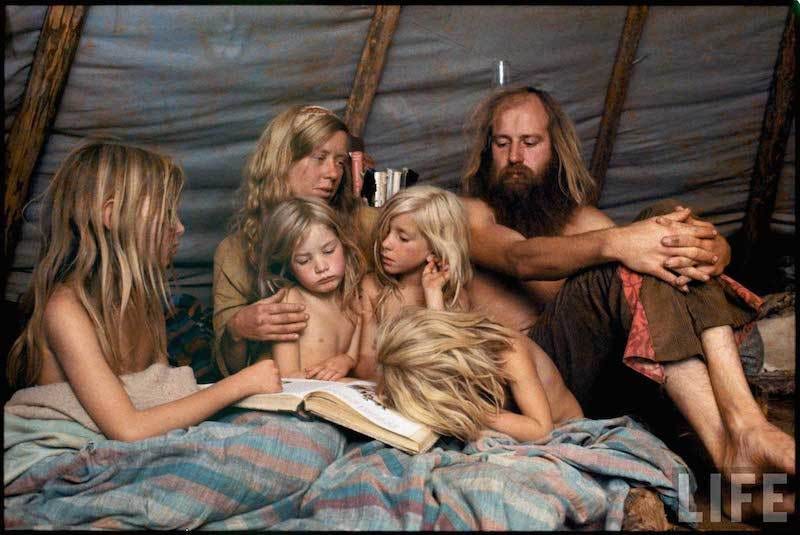Hey Mama, Your Californian Ideology is Showing
the rightward turn of digital tech is part of its foundation, Rudy Jude, and "regressive nostalgia" in action
Thanks to the person here who turned me on to the Rudy Jude Snark Reddit page, which I devoured in one sitting. I dabbled a bit in her clothing early during the pandemic. The jeans took FOREVER to arrive and they looked like clown pants on me. The pointelle leggings ripped immediately. When I saw her Janie dress I felt straight up repulsion. I have no interest in dressing like a toddler. That said, the jeans look amazing on so many people, no shade to anyone into her stuff! I love the pottery studio vibes they give. Clearly, I am not her target market. When the Reddit page pulled some recon that Julie O’Rouke (the designer of Rudy Jude) was an RFK Jr. supporter, I realized the Rudy Jude aesthetic offers a case study of what
termed “regressive nostalgia”. Regressive nostalgia describes, in part, an aesthetic longing for the past that is only possible because the people pining for said past have no real connection to/experience with it. On the tradwife moment, Anu writes,Gen Z lacks authentic references to ground them in history. Gen X and older millennial women had Boomer grandmothers or their own mothers to tell the true stories of what life was actually like as a housewife, and to drill the significance of self-sufficiency into our hardwiring. Gen Z and some younger millennials didn’t have that. There is a generational experience gap.
In the Rudy Jude case, the nostalgia O’Rourke offers is not the 1950s tradwife aesthetic, but a conjuring of the late 60s and early 70s commune hippies. This specific historical-cultural moment, btw, directly connects to the creation of the internet, and to the political mess we now find ourselves in.

I’ve always found the RJ ‘back to the land’ aesthetic a bit delusional considering it RELIES entirely on digital technology, affiliate links, and influencer marketing tactics for distribution and success. Miss me with the communal hippie ideology of the late 60s. While the hippie intentions were not the worst, they were a white, masculine, privileged fever dream of escapism. I said what I said!
Hearing O’Rourke allegedly supported RFK Jr. and her “hot” husband possibly, allegedly (according to reddit) voted for Trump, it all clicked: her regressive hippie aesthetic combined with her work as a digital entrepreneur position her as a modern day expression of The Californian Ideology. The Californian Ideology, described below, is an essay from 1994 by media scholars Richard Barbrook and Andy Cameron. This might be a tall order here, but I’m going try to connect the dots between Rudy Jude, the creation of the internet, and our current political moment.
The Californian Ideology
In 1994, Barbrook and Cameron wrote “The Californian Ideology” to map out the seemingly strange confluence of left and right ideologies coming out of California’s emerging digital technology industry. Reading the essay today, 30 years later, gives me chills. For instance, they prophetically asked:
What is unknown is the social and cultural impact of allowing people to produce and exchange almost unlimited quantities of information on a global scale.
We can answer their question of what happens when information is mass produced: lots and lots of misinfo, disinfo, misogyny, racism, transphobia. And some cute dog pics.
Barbrook and Cameron argue the tech industry in California blends a left leaning social liberalism and DIY ethos, coming out of the hippie commune movement, with a right wing libertarianism and neoliberal faith in free markets. The Californian Ideology blends and believes “both visions at the same time—and by not criticizing either of them.” Until reading this, I never considered commune living hippies and neo-conservatives as sharing anything in common. While these two ideological positions clash on the surface, scratch a bit and the similarities become apparent.
Crucially, the Californian Ideology, left or right version, is bound up with digital technology.
The Hippie Left
The sect of hippies that started communes, the communalists, wanted to create a new world, a utopia ‘unburdened from all that had been.’ These hippies were into building things, living off the grid and on the land, and created a geographically disparate network of DIY enthusiasts. To be clear, these were #NOTALLHIPPIES. Other hippie sects worked to politically change the world, not escape it and start over as the communalists did.
The communalists shared a dream of being free, finding another plane of consciousness and cutting ties from a society built on war, racism, and capitalism. Noble goals by all means. They relied on The Whole Earth Catalogue (a proto version of Google) to source materials and knowledge about how to live off the grid.
According to Fred Turner, these communes collapsed by 1973 because they couldn’t organize basic systems to ensure survival. Turner describes how the women in these spaces, often pregnant, ran the show behind the scenes, putting bleach in water to ensure people didn’t get sick. The invisible infrastructure of women’s labor has been keeping society, and men’s fantasies, alive forever. One woman describes (reddit) her reason for leaving the hippie commune way of life: dishes. Such mundane, everyday work has to get done by someone or the entire system crumbles.

When communal life failed to bring about the sought after utopia, many of the builders and tinkerers landed in San Francisco, California, with the desire still intact to build a new world. They set their sights on digital technology to build an “electronic agora” or an digitally engineered plane of consciousness, a plane that had previously only been thought to be accessible through psychedelic drugs such as LSD. They wanted to create a gathering space where communication could be unfettered and consciousness expanded. They wanted to create a new community. Tech companies have and continue to nod to this heritage. Facebook, for example, still claims it’s in the business of creating community. Turner’s book, From Counterculture to Cyberculture is a fascinating read tracing the history from hippie to techie.
The Yuppie Right
The failed communalists, but still idealistic, white, male hippies land in California and start working on the internet. Some even become titans of the digital tech industry. The right wing libertarians (also white men) get on the internet bandwagon in the 90s when they see the potential for a free, unregulated, market to operate. Newt Gingrich leads this camp, which, much like the right today, hates the government and regulation. For these right wingers, they believe the free market will rid society of those who cannot survive on their own and reward those who can (ie, white men).
In 1994 Gingrich and the conservatives created the “Contract with America,” a legislative agenda that, among other things, set out to get rid of ‘waste, fraud, and abuse’ around governmental spending (ha, sorry Elon, you’re derivative). Barbrook and Cameron describe the enthusiastic embrace Wired magazine displayed towards the new right:
Ignoring their policies for welfare cutbacks, the magazine is instead mesmerized by their enthusiasm for the libertarian possibilities offered by new information technologies. Gingrich and the Tofflers claim that the convergence of media, computing and telecommunications will not create an electronic agora, but will instead lead to the apotheosis of the market, an electronic exchange within which everybody can become a free trader.
To be clear, these neo-cons, unlike the hippie-tech boys, were not trying to find a better plane of existence or to expand consciousness. They were not into building things for the sake of building things. They wanted to make as much money as possible. An unregulated internet promised a space to reward the so-called best and, at the same time, cut all the money directed at ameliorating structural inequalities. Not surprisingly, these neo-cons refused to see that social programs (ie the government) and communal labor created the internet. Barbrook and Cameron, again:
All of this public funding has had an enormously beneficial - albeit unacknowledged and uncosted - effect on the subsequent development of Silicon Valley and other hi-tech industries. Entrepreneurs often have an inflated sense of their own 'creative act of will' in developing new ideas and give little recognition to the contributions made by either the state or their own labour force. However, all technological progress is cumulative
California, the state, and the tech industry therein, were both built from government subsidies and massive state planning. The internet, like California, was funded and built by the military (the defense budget) in conjunction with universities. Business did not build the internet. By the time Zuckerberg showed up to Harvard, our tax dollars had built the internet. He just brought misogyny. I always come back to this point as our current tech CEOs behave as if they are geniuses building from their personal brilliance.
Left and Right Convergence
We have two seemingly disparate groups coming together to build and distribute the internet, neither of which fully grasp the importance of other people. Neither are too keyed into the importance of everyday labor (dishes) or the importance of communal infrastructure.
The Californian Ideology is where the hippie communalists and the libertarian right meet: both distrust government, desire to be ‘free’ from the man, over estimate self-sufficiency, and ignore a fundamental human dependence we have on each other. This configuration of the left and right also both share a technological determinism, believing that technology will bring their disparate utopian visions unproblematically into being. The left wants freedom to be creative, unhindered the contradictions of a militaristic capitalist economy. The right wants to be unburden by any social program that takes aim at social injustices via economic redistribution. Both need digital technology to realize their goals.
Regressive Rudy J
First off, a disclaimer: Obviously I do not know Julie O’Rourke, nor do I know her politics beyond conjecture. My commentary is on her public persona, constructed and expressed across her public platforms. A persona is a way organize identity for a strategic public presentation of oneself. Personas are a gathering of symbols, narratives, tropes, aesthetics deployed to communicate identity and belonging. Certain online personas have become genres. We know the “influencer” persona as soon as we see the matcha latte and the pilates selfie. We know the tradwife persona upon seeing sourdough bread and baby in a sling.
As
details, O’Rourke’s appeal is her performative ability to labor creatively, autonomously, freely. Through her visuals, actions, etc, O’Rourke’s persona taps into a version of the communalist, DIY hippie aesthetic. Yet, unlike the hippies, she completely and willingly embraces a neoliberal market logic. Her entrepreneurial persona, however, is kept under wraps. The symbols of entrepreneur are not usually aligned with back to the land DIY and wild haired kids. While she’s a perfect storm of hippie leftism (natural fibers/foods/toys), and right wing neoliberal entrepreneurism (its all done for the grid, to build her brand, and to buy light fixtures?), she only deploys the former in her presentation of self.Julie O’Rourke has successfully turned her lifestyle into a commodity. She’s been dealt a good hand: she’s attractive, blond, white, hetero, married, fertile, has a “hot” husband, and cute kids. All of which pay dividends in the digital-influencer economy. But, she is not free. She’s tied to her networks and the precarious whims of digital media. This is definitely not what the hippie communalists were after. They were trying to escape the market! This is the disconnect
gets at in “regressive nostalgia”: people already lived, tried, experienced such a DIY existence and it pretty much sucked, especially for women.Not not MAHA
In this light, her support of RFK Jr. is not surprising. Just like the Californian Ideology, she blends aspects of the hippies but lives under the market logic of the neo-cons, while personifying the escapism of both. As I’ve been working on this draft, The Strategist recently ran an interview with O’Rourke (reddit folks think this is a clean up job as the RFK Jr. float picture makes the rounds). In the interview she attempts to shut down speculation on her alliance with MAHA/RFK Jr.:
I do not identify as MAHA. I’m not a political movement. The thing that I want people to get from us is seeing an alternative way to live, but that doesn’t have to do with my beliefs, or your beliefs don’t have to be the same.
Yikes. Here, her entrepreneur persona is slipping through the cracks. She doesn’t care what your beliefs are as long as you buy into, literally, her “alternative way to live.” Her inability to understand that any way to live, let alone their “alternative way to live,” is completely bound up in privilege. I know of zero people that could live the way she does. Showcasing an “alternative way to live” is and has always been a political act, just ask the hippies. Claiming otherwise is either ignorant or deceitful.
O’Rourke’s refusal to see how it is in fact political movements that structure how we live, as well as the alternatives we can envision, is very Cali Ideology. Living on an island is an illusion of self-sufficiency and a deliberate refusal to see all the people/infrastructure on which we all depend. Could she live her life without UPS drivers? Without software engineers? Without immigrants and garment workers? Without vaccines? RFK Jr.’s persona is a symbol within the MAHA anti-intellectual plague we are living through, where health, sickness and communicable diseases are the result of individual choices. The logic goes: If we want to be well, we should just make better choices, or follow O’Rourke’s “alternative” ways.
This political movement takes the position that the protocols of science and modern medicine should take a back seat to the whims of the individual. Science, medicine, technology all require lots of funding, time, education, buildings, materials and organization from the top. The MAHA political movement is nothing but privileged white people selfishly, and stupidly, thinking they don’t need others because they can choose how to live or “do their own research.” Once again, like the communalists and neo-cons, privilege obscures their ability to see how dependent we are on each other for survival.
Escaping the Californian Ideology
When I think about the communalists, I can’t help but compare them to the Black Panthers. The Black Panthers provided free food for kids, clothing, and babysitting at meetings. They provided infrastructure. And while there was sexism within their organization, they understood the importance of centering dependence and community in their politics. The communalists missed this memo. And, the neocons do not care about material needs, as long as theirs are met.

How do we get out of this hell of the Californian Ideology? Barbrook and Cameron offer what they see as an antidote: regulation from the top. They point to the European embrace of state regulation as a form of protection. America, as we know too well, likes to go rogue. More urgently, Salvaggio reminds us “the tech industry's weakness is that it has never understood the emotional and social complexity of actual human beings.” They also don’t understand that human beings need infrastructure to survive. Or, another way to put this is they don’t realize how important doing the dishes is to society. As I listen to the garbage coming from Musk and other tech figures, as well as the crunchy wellness mamas, I can’t help but hear the Californian Ideology: a delusional belief in self-sufficiency, attempts to build an isolated and utopian world, a belief they can opt out of what they don’t like, and refusal to recognize all of the labor that goes into keeping the world running. We all depend on one another and we need a government that recognizes and sustains the importance of connection and care.
As much as I’m deriding the communalist hippies, I do wonder where we’d be if their vision of the internet had dominated. It’s pretty clear that today, 2025, the neo-con version of the internet as a marketplace won the day. The internet is little more than a place to buy and sell everything from ourselves, our lifestyles, our ideas, to our used Rudy Jude jeans.
Rudy Jude can have her island. For as much as O’Rourke postures as a hippie drying lavender, she’s working for tech like the rest of us.








Omg I’d recognize that Taylor Camp pic anywhere - AND that baby seat is identical to the one Julie Rourke got for her last baby. Wow! San Juan Islands of WA where I lived for a decade is very very much this -
white hippies and many are MAHA. And all supported by the uber wealthy Seattle elites who hire islanders to maintain their estates & to provide the “culture” - the hand cut ramen noodle house (run by a white man who in all 8-9 years of business has once acknowledged what happened to the significant Japanese people in the islands- spoiler - it wasn’t good) to the Trump loving goat cheese maker to all the local acupuncturists & massage therapists etc etc etc who worry if EMFs are getting too bad & if the local carrots grown by a former hedge fund manager are biodynamically grown or “just organic” but don’t care about local farmworker activists getting violently detained by ICE recently in the neighboring county.
Some day I’ll write that story ;)
Glad others are tracking these things as well.
I unfollowed her in 2021 or 2022 I think. The homesteading life was very charming at first but after a while it felt like parody while she sold health supplements or clothes. The commune-to-cyberspace pipeline is so fascinating (and depressing), reminds me of the Maintenance Phase podcast, where the hosts often highlight the wellness-to-QAnon connection, well before I’d ever heard of RFK.